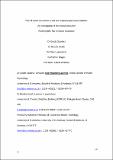Files in this item
Fear of cancer recurrence in oral and oropharangeal cancer patients : an investigation of the clinical encounter
Item metadata
| dc.contributor.author | Ozakinci, G. | |
| dc.contributor.author | Swash, B. | |
| dc.contributor.author | Humphris, G. | |
| dc.contributor.author | Rogers, S. N. | |
| dc.contributor.author | Hulbert-Williams, N. J. | |
| dc.date.accessioned | 2018-10-11T23:49:16Z | |
| dc.date.available | 2018-10-11T23:49:16Z | |
| dc.date.issued | 2018-01 | |
| dc.identifier | 251071341 | |
| dc.identifier | bdb242b3-1635-4d69-8dbe-3bdfc9668641 | |
| dc.identifier | 85031327919 | |
| dc.identifier | 000423383300072 | |
| dc.identifier.citation | Ozakinci , G , Swash , B , Humphris , G , Rogers , S N & Hulbert-Williams , N J 2018 , ' Fear of cancer recurrence in oral and oropharangeal cancer patients : an investigation of the clinical encounter ' , European Journal of Cancer Care , vol. 27 , no. 1 , e12785 . https://doi.org/10.1111/ecc.12785 | en |
| dc.identifier.issn | 0961-5423 | |
| dc.identifier.other | ORCID: /0000-0001-5869-3274/work/37646760 | |
| dc.identifier.other | ORCID: /0000-0002-4601-8834/work/64033843 | |
| dc.identifier.uri | https://hdl.handle.net/10023/16193 | |
| dc.description | Funding: British Association of Head and Neck Oncologists | en |
| dc.description.abstract | Fear of cancer recurrence (FCR) is common among individuals treated for cancer. Explorations of how this fear is expressed within an oncology setting and responded to are currently lacking. The aim was to investigate how head and neck cancer survivors in follow-up consultations express FCR, investigate how a healthcare professional addresses recurrence fears, and examine how survivors experience this interaction. We recorded the follow-up consultations of those participants who have reported FCR as a concern on the Patient Concerns Inventory. We also conducted a follow-up phone interview with the participants. We analysed the transcripts using thematic analysis. Five men and six women were recruited, aged 55–87 (mean age = 64). Follow-up consultation analyses revealed that the consultant used “normalising FCR,” “reassurance,” and “offer of referral to a counsellor.” Interviews revealed themes around how they coped with FCR, relevance of personal history on FCR, and the impact of feeling gratitude towards the consultant on expression of FCR. Analyses indicate that patients may feel reluctant to raise their FCR with their clinician for fear of appearing “ungrateful” or of damaging a relationship that is held in high esteem. Findings indicate the initiation of FCR with patients can be beneficial for patient support. | |
| dc.format.extent | 497644 | |
| dc.language.iso | eng | |
| dc.relation.ispartof | European Journal of Cancer Care | en |
| dc.subject | Fear of cancer recurrence | en |
| dc.subject | Consultations | en |
| dc.subject | Head and neck cancer | en |
| dc.subject | Communication | en |
| dc.subject | Emotional regulation | en |
| dc.subject | H Social Sciences | en |
| dc.subject | RC0254 Neoplasms. Tumors. Oncology (including Cancer) | en |
| dc.subject | NDAS | en |
| dc.subject | SDG 3 - Good Health and Well-being | en |
| dc.subject.lcc | H | en |
| dc.subject.lcc | RC0254 | en |
| dc.title | Fear of cancer recurrence in oral and oropharangeal cancer patients : an investigation of the clinical encounter | en |
| dc.type | Journal article | en |
| dc.contributor.institution | University of St Andrews. School of Medicine | en |
| dc.contributor.institution | University of St Andrews. Health Psychology | en |
| dc.contributor.institution | University of St Andrews. St Andrews Sustainability Institute | en |
| dc.contributor.institution | University of St Andrews. Population and Behavioural Science Division | en |
| dc.contributor.institution | University of St Andrews. WHO Collaborating Centre for International Child & Adolescent Health Policy | en |
| dc.identifier.doi | 10.1111/ecc.12785 | |
| dc.description.status | Peer reviewed | en |
| dc.date.embargoedUntil | 2018-10-12 |
This item appears in the following Collection(s)
Items in the St Andrews Research Repository are protected by copyright, with all rights reserved, unless otherwise indicated.

